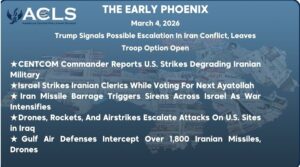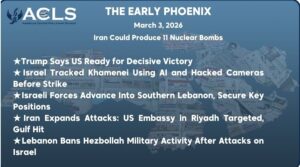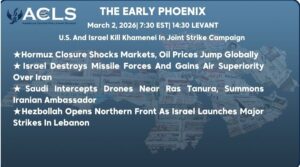Israeli Operations, US Intercepts Iranian Arms, Syrian Clashes, Cyber Attacks
TOP HEADLINES:
- Nasser Hospital Operation: IDF Arrests 20
- US Intercepts Iranian Arms Bound for Houthis
- Iraqi Factions Strike Occupied Golan Heights in Israel
- Israeli Strikes Kill 13 Hezbollah and Amal Members
- Countering Asma al-Assad’s Economic Operations: Effects of the Anti-Normalization Act
====================
★ ISRAEL & PALESTINIAN TERRITORIES
- Multiple Fatalities, Injuries Reported, Bus Stop Shooting.
In a shooting incident at a bus stop in Kiryat Malachi, east of Ashdod, the Israeli Broadcasting Corporation announced that a gunman killed two and wounded four, while Israeli ambulance services reported three deaths and five injuries. The Inspector General of Police described the incident as serious. Reports suggest the shooter attempted to continue his attack before responders neutralized him. Authorities instructed residents of neighboring areas to stay indoors, and guard teams declared a state of alert in those towns.
- Israeli Paratrooper Killed in Southern Gaza Clash.
Staff Sergeant Noam Haba, a 20-year-old Israeli soldier from the 202nd Battalion of the Paratroopers Brigade and a resident of Jerusalem, was killed in battle in the southern Gaza Strip. His killing comes 35 years after his uncle Yossi was killed in military operations in Gaza. Since the attacks began on October 7, 572 Israeli soldiers have been killed, 235 of them since the ground incursion. In the same battle, another paratrooper was seriously injured and other soldiers sustained varying injuries, all of whom were evacuated to the hospital for treatment.
- West Bank Raids Result in 1 Fatality and 15 Injuries.
In a sharp escalation of tensions in the West Bank, Israeli forces launched multiple raids across towns, including Ramallah, Nablus, Tulkarm, and Hebron, resulting in one Palestinian death and fifteen injuries. The operations involved deploying snipers, destroying a lathe in Beitunia with gas bombs, and arresting four individuals in Alar, among them an Islamic Jihad leader. Concurrently, the “Great Dawn” campaign, promoting dawn prayers, saw a decrease in Al-Aqsa Mosque attendees due to settler incursions under police protection. This period also witnessed heightened settler aggression in Kisan village, with the burning of property and livestock.
- Fatal Shootings of Two American Teens in the West Bank.
In recent incidents in the West Bank, two American teenagers, Mohammad Khdour and Tawfic Abdel Jabbar, were fatally shot in separate events. Khdour, aiming for a law degree in the U.S., and Abdel Jabbar, planning to continue his studies, both lost their lives under circumstances involving alleged Israeli military fire. Khdour died in a Ramallah hospital after a shooting, with the incident’s details under scrutiny as Israeli forces’ involvement is suggested but not confirmed. Abdel Jabbar’s death, described as unprovoked by a vehicle passenger, also points to Israeli soldiers’ potential role, challenging initial claims of the teenagers’ aggressive behavior.
- Hamas Leader Killed, Israeli Army Achieves Objectives in Gaza.
Ahmed Gul, a commander from the Hamas Beach Brigade involved in a massacre in southern Israel and the abduction and subsequent killing of soldier Noa Marciano at Shifa Hospital in Gaza, was killed in a drone airstrike. Gul’s death comes amid continued Israeli air and ground strikes targeting military infrastructure and rocket launchers of Hamas, designated as a terrorist organization by several countries. These operations have included commando raids in Khan Yunis, where terrorist targets were destroyed, and weapons and explosives were seized. Additionally, an attempt by a terrorist group to approach Israeli forces was thwarted, resulting in the targeted killing of 15 Hamas members.
- Nasser Hospital Operation: IDF Arrests 20.
On February 15 and 16, 2024, the Israeli Defense Forces (IDF) carried out a precise operation at Nasser Hospital in Khan Yunis, Gaza. This operation led to the arrest of 20 individuals suspected of participating in the October 7 attacks, based on intelligence that Hamas was utilizing the medical facility for military purposes. Rear Admiral Daniel Hagari emphasized the operation’s meticulous planning, underscoring the delivery of essential supplies to the hospital and the provision of safe evacuation routes for staff and patients. According to the Palestinian News Agency (Wafa), the operation contributed to the deaths of four patients due to oxygen shortages amidst a power outage, highlighting the severe conditions within the hospital, which include shortages of food, baby formula, and water, impacting patients, medical staff, and their families. The World Health Organization expressed significant concern for those trapped inside the facility, stressing the dire need for medical supplies and fuel to continue life-saving services.
- Netanyahu Halts Cairo Talks, Vows Action in Rafah.
Israeli Prime Minister Netanyahu paused Israeli involvement in Cairo’s hostage discussions, bypassing the War Council, causing uproar among its members and the hostages’ families. He linked negotiation progress to Hamas dropping its unrealistic demands and confirmed ongoing strikes in Rafah, hinting at a potential ground assault despite the risk of exacerbating the refugee situation. This move shocked the detainees’ families, who saw it as abandoning the hostages.
- Arab States Aid Israel’s Blockade Evasion; Arab League Counters.
In February 2024, revelations emerged that Israel bypassed the Yemeni blockade in the Red Sea with assistance from Jordan, Saudi Arabia, and the UAE, enabling goods to reach Israel via Haifa, amidst Ayatollah Seyyed Ali Khamenei’s call for Islamic nations to cut ties with Israel to support Palestinians. This act of circumvention faced criticism as complicity with Israeli policies against Gaza. In response to the ongoing conflict, the Arab League, on February 15, 2024, designated 60 Israeli organizations as part of its “Arab National Terrorist Lists” and announced a boycott of 97 companies operating in Israeli settlements. The League also condemned attempts to undermine the UNRWA and urged for support to Palestinian children affected by the conflict, highlighting the dire situation and forced displacement of Palestinians as threats to Arab national security and regional peace.
====================
★ YEMEN
- US Intercepts Iranian Arms Bound for Houthis.
The US Coast Guard intercepted an Iranian arms shipment destined for the Houthis in Yemen, as announced by the US Central Command. The operation, executed by the USCGC Clarence Sutphin Jr, revealed over 200 packages of ballistic missile components, explosives, surveillance devices, communication equipment, and anti-tank missile launchers. This breach of UN Security Council Resolution 2216 endangers international maritime safety and global trade. General Michael Eric Corella highlighted the US’s dedication to thwarting Iranian arms shipments with allied support, amidst accusations from the Houthis of over 400 US and British attacks since January. The US insists these strikes are retaliatory, emphasizing a desire to avoid escalation, despite recent US-British airstrikes in Hodeidah Governorate’s Bayt al-Faqih district.
- Russia and China Criticize Western Actions in Middle East at the UN.
During a UN Security Council session on the Middle East, Russia’s Deputy Permanent Representative Dmitry Polyansky and China’s delegate Zhang Jun criticized Western countries for actions they consider violations of international law. Polyansky argued that the right to self-defense does not justify actions undermining freedom of navigation, while Zhang warned against using international law and UN resolutions as pretexts to escalate tensions, emphasizing that the Council has not authorized any country to use force against Yemen.
====================
★ SYRIA
- Daraa Clashes: Locals Push Assad Regime to Withdraw.
Last week in southern Syria, regime forces engaged in clashes with local groups in Mahaja, Daraa, under the guise of targeting “wanted individuals,” resulting in both military and civilian casualties. The confrontation, characterized by shelling and gunfire, ended with the regime’s withdrawal amidst losses, with Russian military involvement observed in the vicinity. Concurrently, in Deir ez-Zor, the killing of two truffle pickers by unidentified assailants led to a harvesting ban by the Fourth Division, suggesting economic motives. Additionally, an unidentified man’s body was found in the Euphrates River, indicating the ongoing turmoil and violence affecting various parts of the region.
- Combating Asma al-Assad’s Secret Economic Office: The Impact of the Assad Regime Anti-Normalization Act.
Asma al-Assad’s clandestine economic office, long a symbol of Syrian regime corruption, faces a formidable challenge with the passage of the Assad Regime Anti-Normalization Act. This covert operation, meticulously organized and directed from the Republican Palace, exploits Syrian merchants and industrialists through a varied scheme of financial surveillance and intimidation. Segmented into departments overseen by key figures like Colonel Ali Shalish and Major General Ahmed Deeb, the office targets individuals deemed capable of paying exorbitant fines under fabricated legal pretexts, ensuring compliance through coercive measures. The Assad Regime Anti-Normalization Act of 2023, codified as S.2342, can disrupt this operation by outlining measures that oppose any acknowledgment or normalization of relations with Bashar al-Assad’s government, leading to a reduction in its international legitimacy and economic stability. Through strategies such as actively opposing international normalization, enforcing sanctions, and discouraging reconstruction efforts, the Act should lead to undermine the regime’s economic power and advance the Syrian people’s pursuit of justice. While direct intervention in the Secret Economic Office’s activities is not feasible, the Act can indirectly constrain its operational capabilities, thereby limiting its capacity to exploit Syria’s economic resources and strengthen the regime’s grip on power.
====================
★ IRAN
- US Cyber Operation Renders Iranian Spy Ship Inoperative.
The United States successfully executed a cyber attack on the Iranian vessel “Behshad,” disrupting its intelligence-gathering capabilities intended to aid Houthi forces in Yemen. This operation, prompted by Iranian-backed militia attacks in Iraq, targeted the ship to impede its communication and intelligence exchange activities. Behshad, strategically positioned near Djibouti port and a Chinese base, underscores Iran’s efforts to fortify its maritime assets against potential threats.
- Iran Retaliates by Blocking META Programs After Ayatollah’s Account Closure.
Following Meta’s decision to remove the accounts of Iran’s Supreme Leader Ali Khamenei from Instagram and Facebook due to policies against individuals associated with violence, Iranian authorities have implemented new regulations requiring advertising licenses for social media accounts with over 5,000 followers. These regulations, presented under the guise of advertising and taxation oversight, are, in fact, a direct response to Meta’s actions, signaling the Iranian government’s resolve to counter what it perceives as censorship. Through these measures, the government aims not only to regulate but also to retaliate, tightening its grip on social media access and imposing licensing requirements on influential accounts. This strategy effectively restricts the platform’s influence and outreach, consolidating the government’s control over online communication channels and quelling dissenting voices with greater authority.
In other related news, the social media platform X has removed verification badges from Iranian media outlets’ accounts, including those of Tasnim News Agency and Press TV, following pressure from the Israeli lobby. This action comes amidst claims that X provides premium services to sanctioned entities, highlighting concerns over potential violations of US sanctions.
- Iran’s Claims Ownership of Antarctica.
Iranian Admiral Shahram Irani’s claims regarding ownership of Antarctica have alarmed the international community and challenged the 1959 Antarctic Treaty, which stipulates that the continent be used for peaceful and scientific purposes only. The US State Department responded to the threats by confirming that the Iranian funds released in Qatar were used to purchase humanitarian goods only, denying the possibility of financing an Iranian military base in Antarctica. The controversy comes in the context of regional tensions reinforced by Western interventions and controversial financial support from the United States for Iran, which complicates international relations and raises security concerns.
- New Details Reveal the Iranian Oil Smuggling Network to Bypass US Sanctions.
New leaks reveal the involvement of Idman Nafrieh and Ali Bayandarian, who are close to the Iranian leader, in smuggling oil to bypass US sanctions. The two collaborate with Parsargad Bank and the Imam’s Orientation Headquarters to sell oil illegally, using the cover commission to issue lines of credit to brokers. The Iranian regime is resorting to complex techniques, including barter and the use of cryptocurrencies, to circumvent sanctions and maintain its oil exports. Despite the punitive measures, Iranian oil exports increased significantly, indicating the success of these strategies.
- Iran Vows Retaliation Following U.S. Sanctions and Oil Seizure.
On February 4, the U.S. seized over 520,000 barrels of Iranian oil for sanctions evasion, targeting a network financing the Islamic Revolutionary Guard Corps (IRGC). This action followed the DOJ’s announcement on February 2 linking Iran to recent militant attacks, emphasizing the need to disrupt its illicit oil trade. In response, Iran warned of reciprocal actions on February 15, after the U.S. imposed new sanctions on February 14 against Iran’s Central Bank and a technology smuggling network. These sanctions aimed to thwart Iran’s financial support for the IRGC-QF and Hezbollah, entities destabilizing the Middle East. Despite sanctions, Iran continues to adapt, employing sophisticated strategies to maintain its oil exports and technological procurements, signaling a persistent challenge to U.S. efforts in curbing its regional influence and financial networks supporting militant activities.
====================
★ IRAQ
- Iraqi Factions Bomb a Military Target in the Golan with Drones.
Armed Iraqi factions announced their bombing of a military target in the Israeli-occupied Golan region, using drones. The operation came as a response to Israeli actions in Gaza and in support of the Palestinians. These factions, known as the “Islamic Resistance in Iraq,” have previously claimed responsibility for similar attacks against Israeli and American targets in Iraq and Syria, stressing that they will continue to carry out operations in response to the Israeli aggression against Gaza since October.
- Iraqi Parliamentary Initiative to Impose Economic Sanctions on Jordan.
Iraqi representatives, led by Representative Hadi Al-Salami, propose imposing economic sanctions on Jordan, in response to accusations of Jordan’s participation in American raids against armed factions in Iraq. The proposal includes canceling economic privileges granted to Jordan, such as selling oil at reduced prices, and comes in the context of preserving Iraqi sovereignty and in response to foreign interference. The move reflects the tension in relations against the backdrop of allegations of Jordan’s participation in the American raids, which were denied by a Jordanian military source, stressing respect for Iraq’s sovereignty.
====================
★ LEBANON
- Israel Escalates Strikes on Hezbollah Following Missile Attack.
Israeli Defense Minister Yoav Galant declared a ramping up of strikes on Hezbollah in retaliation to a missile assault on Safed, cautioning that Air Force aircraft are now equipped with bombs capable of reaching farther targets. Galant emphasized Israel’s aversion to conflict while asserting preparedness to safeguard northern residents’ return. Concurrently, military maneuvers aligned with raids on Hezbollah positions in Lebanon, prompted by the death of a soldier and injuries sustained in Safed.
- Israeli Strikes Kill 13 Hezbollah and Amal Members.
The Amal Movement and Hezbollah reported the deaths of 13 members in clashes with the Israeli army in southern Lebanon today. Israeli artillery targeted five villages in southern Lebanon, including Qantara, Taibe, and Blida. Meanwhile, an Israeli opinion poll reveals 71% of citizens endorse initiating a military operation against Lebanon. Ongoing clashes and raids by Israeli forces in southern Lebanon persist, inflicting significant damage and highlighting the escalating border tensions.
====================
★ EGYPT
- North Sinai Governor Denies Buffer Zone Reports in Rafah, Egypt.
North Sinai Governor, Mohamed Abdel Fadil Shousha, refuted rumors of a buffer zone setup in Rafah, Egypt, for displaced individuals. He clarified that ongoing efforts aim to compensate those impacted by counterterrorism operations. These statements coincide with warnings from the United Nations Aid Coordinator regarding potential Palestinian influx into Egypt if Israel targets Rafah, condemning forced displacement as an unacceptable Israeli initiative. With heightened Egyptian alerts and border security preparations, Rafah emerges as a critical concern for Egypt due to humanitarian and security considerations, particularly amidst Israel’s anticipated expansion of Hamas operations.
====================
★ THE ARABIAN GULF
- Saudi and Iranian Diplomatic Talks on Rafah and Gaza Crisis.
Saudi Foreign Minister Faisal bin Farhan received a call from his Iranian counterpart, Hossein Amir Abdullahian, to discuss bilateral relations and regional developments, including the situation in Rafah and the humanitarian crisis in Gaza. A statement from the Saudi Foreign Ministry noted discussions on efforts to address the Gaza humanitarian situation, highlighting both countries’ commitment to regional stability and peace promotion.
- Starlink” Internet Service Activated in UAE Field Hospital in Gaza.
Israel agrees to operate the “Starlink” satellite Internet service in the Emirati field hospital in Gaza, to enhance medical care by enabling videoconferencing and remote diagnosis. The agreement comes after the UAE’s cooperation with international organizations to provide this service, with the aim of saving patients’ lives. The step is necessary to ensure effective medical care in light of repeated outages of communications services in the Gaza Strip, and comes in the context of the UAE’s continued support for the Palestinian people amid the devastating Israeli war on Gaza.
====================
📌 Incase you missed it,
📰 Iran’s Imminent Game: Steering Assad Toward an Inevitable Clash with Israel
📰 The Early Phoenix Feb 14, 2024
📰 The Early Phoenix Feb 13, 2024
🔗 Follow the latest news from the American Center for Levant Studies via Google News



